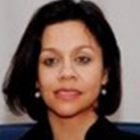Panel Talk SKI24
Using Technology to Reduce the Learning Divide in Vocational Education
Date Thursday, Dec 3 Time – Room: Tegel
Universal access to quality skills education - that is the vision for 2030 as defined in the Qingdao declaration in May 2015. In this session we’ll discuss what we can do to effectively improve learning pathways in all parts of the world. International voices will shed a light on the reality and the promises of the use of technology to improve access to high-quality technical and vocational education and training (TVET). The session is organized by the UNESCO-UNEVOC, the International Centre for Technical and Vocational Education and Training, located in Bonn.

Shafika Isaacs
Programme Director, ICT4D Professional, South Africa
Shafika Isaacs is an independent consultant who specialises in the role of digital technologies in improving education access, quality and equity. She has worked with UNESCO, eLearning Africa, the Bill and Melinda Gates Foundation, UNICEF, the Commonwealth of Learning (COL), the World Bank, Cisco, Intel and Microsoft.
She was formerly the founding Executive Director of SchoolNet Africa, Education Director at Mindset Network, Partner Development Lead for Microsoft’s Unlimited Potential Group in the Middle East and Africa and Senior Programme Officer for the International Development Research Centre (IDRC).
Shafika serves on the Global Compact for Learning Research Task Team, UNESCO's Mobile Learning Policy Advisory Group, The Lewis Foundation Board of Trustees, NMC Horizon K-12 Report Advisory Board, Intel's Policy Advisory Group, ONLINE EDUCA BERLIN Steering Committee and is the Chair of SchoolNet South Africa. She has authored a number of research reports and papers related to ICT in Education in Africa.
As a recipient of the Nelson Mandela Scholarship Award, she obtained a Master of Science degree in Science and Technology Policy at the University of Sussex and an Executive MBA cum laude at the Graduate School of Business at the University of Cape Town. Shafika Isaacs served as editor of The eLearning Africa Report 2013.

Donald Clark
eLearning Expert and Strategist, Plan B Learning, UK
Donald is an entrepreneur. He was CEO and one of the original founders of Epic Group plc, which established itself as the leading company in the UK e-learning market, floated on the Stock Market in 1996 and sold in 2005. Describing himself as ‘free from the tyranny of employment’, he now has a foot in two camps, one as an investor and Board member of PlanB learning, WiQi, LearningPool, Cogbooks, the other in the public sector as a Trustee for the University for Industry, City & Guilds and Deputy Chair of Brighton Arts Festival & Dome. He has been involved in consulting and implementing online learning in schools, FE, HE, corporate and government.
Donald has been involved in film, games, web, mobile, MOOCs, Oculus Rift and won many awards for the design and implementation of online learning. He is a regular speaker at national and international conferences, having delivered talks in the US, Europe, Far East, Middle East and Africa, and won several ‘Best speaker’ awards … also a regular (and controversial) blogger on online learning!
Links
http://www.planblearning.com/Bio/

Elke Wemhoff
GIZ, Germany
Elke Wemhoff has worked in the area of further education and training in development cooperation at GIZ (Deutsche Gesellschaft für Internationale Zusammenarbeit/German Development Cooperation) for almost 10 years. She currently works as project manager in the area of digital learning and virtual cooperation at the Academy for International of Cooperation of GIZ.
A big part of her work deals with e-learning capacity development projects in different parts of the world, among them Southeast Asia, Africa and the South Caucasus. During the past one and a half year, she has coordinated among other things the development of e-learning capacities in two GIZ projects in Indonesia. In these projects she has accompanied the training institutions of Indonesian Ministries in developing a digital strategy and in developing and implementing e-learning courses independently, in order to use technology-enhanced education and training to reach the high number of potential learners spread all over the islands of Indonesia.
